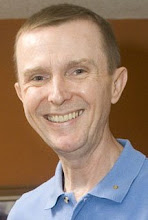"The work that personal historians do is sacred. It's the work of the soul. It's blissful and heartfelt work."
So said James Walsh as he began his presentation at an annual conference of the Association of Personal Historians. Walsh teaches history at the University of Colorado in Denver. He focuses on the oral tradition. This tradition - passing along history through the stories of the participants - is near and dear to the hearts of all of us creating video biographies, whether we do it as a profession or as a hobby.
Walsh continued by recounting an African proverb that says there are two stages of death. The first stage is sasha. Sasha are people who have passed away physically - but the living still remember them and tell their stories. So the sasha are not yet dead. The second stage is zamani. Zamani are people who have also passed away physically. However, the living no longer remember them, nor do they tell their stories. Zamani are truly dead.
What a powerful proverb - and it connects perfectly with the quote at the beginning of this article. Speaking for myself, the work I do as a personal historian, as a video biographer working through Family Legacy Video, does make me feel blissful and is certainly heartfelt. It is indeed sacred and the work of the soul. And it is dedicated to making sure my clients and my family remain sasha, not zamani, after they depart this physical world.
And yet there are many who feel they have nothing to say, that their life stories don't merit telling and preserving. To this I offer another story related by James Walsh. He was a young man from a Pennyslvania steel town, blue collar through and through, plopped down in the middle of Duke University thanks to a wrestling scholarship. He had little in common with his classmates and felt quite insecure in class. As a result he sat in the back, saying little.
One day, his professor pulled him out of class. "Walsh," asked the professor. "Why aren't you talking in class?"
"Well professor," the young man answered, "I guess I don't think my ideas are very good."
With that, the professor slammed down his fist. "Let me ask you this," he exclaimed. "How many people in the history of the planet will ever see the world from your perspective?"
Walsh thought for a moment and then answered, "No one."
"So," said the professor. "If you won't tell us what the view is like, who will?"
Exactly - who will describe the unique views and perspectives of your life, or those of your parents, grandparents or other relatives if you or they do not?
The answer is obvious. By capturing and preserving our stories through video biographies we celebrate our unique views of the world and of our places in it. We share and relish our video bios while we're alive. And then, after we depart this earthly coil, our stories, as told by us, remain to be enjoyed by future generations of our families, keeping our memories alive, connecting our family past with its present and future - and keeping us sasha.
If this isn't sacred, the work of the soul, I don't know what is.
If you've already started preserving your family storytellers on video, bravo! If you haven't begun yet - start. Now.
And remember that Family Legacy Video is here to help.
Subscribe to:
Post Comments (Atom)

No comments:
Post a Comment